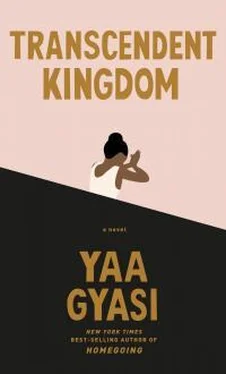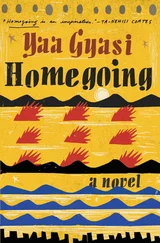I wasn’t thinking about Lazarus much in the days after Nana died. I had already stopped believing in the possibility of extravagant miracles. But small miracles, everyday miracles, like my mother rising from her bed, those still seemed worth hoping for.
“Please get up,” I said to her each day before I left for school, vigorously shaking her arm, her torso, her legs, until she made some kind of noncommittal noise at me, some gesture that eased my mind, allowed me to believe that maybe, maybe, that day would be the day.
She’d already lost her job, but I didn’t know that. The home health company called a hundred times or more, but I had long since stopped answering the phone. I kept to my routine like my routine would save me, and then on a Thursday, a week and a half in, I went into my mother’s room and she wasn’t in her bed.
My heart soared. I had done it. Like Jesus, I had willed a woman to come forth. I went to look for her in the living room, the kitchen. Her car was still parked in the garage, and it wasn’t until I saw that little tan Camry there, its headlights like eyes peering into my soul, that I knew what a grave mistake I had made. I ran back to my mother’s bedroom, opened the door to the bathroom, and found her there, submerged in the bathtub with an empty bottle of Ambien resting on the counter.
I never wanted to see a policeman again, and so I called Pastor John.
“Slow down, honey,” he said, and then panicked. “My God, my God. Just wait there.”
The ambulance arrived before Pastor John did. The EMTs lifted my mother onto the stretcher. She couldn’t look at me; she just kept saying “I’m sorry,” and “I should have let him take him.”
“What?” I asked. “Who?”
“He wanted to take Nana to Ghana and I said no. Oh, Awurade, why, why didn’t I let him take him?”
Pastor John came in as they took my mother. We followed the stretcher out of the house, and I barely listened as Pastor John received instructions from the EMTs. I shut my eyes tightly, so tightly that I started to feel the tension in my forehead. I cried and I prayed.
41
Pastor John lived in a bright yellow house about three blocks away from the First Assemblies of God. The house had two empty bedrooms because their oldest sons had moved away, gone on to other churches in Alabama to be youth pastors and worship leaders themselves. I stayed in the oldest boy’s room, while Mary, their daughter, stayed with an aunt. I’m still not sure why they sent Mary away. Maybe they thought my family’s misfortune was catching.
My mother had been taken to the UAB psychiatric hospital in Birmingham. It was about an hour and a half’s drive away, but she didn’t want me to see her there, and so, though I had begged, Pastor John and his wife, Lisa, never made the drive out. Instead, I stayed in Billy’s room. I walked to school. I spoke as little as possible and I refused to go to church on Sundays.
“I’m sure your mama would like it if you would say a prayer for her this Sunday,” Lisa said. The night I’d arrived, she’d asked me what my favorite thing to eat was. I couldn’t think fast enough so I’d told her spaghetti and meatballs, a dish I’d had only a handful of times. My family rarely ate out and my mother cooked only Ghanaian dishes. That night, Lisa made a big batch of spaghetti and meatballs and the three of us ate in near silence.
“I’m not going to church,” I said.
“I know you’re going through a lot, Gifty, but remember that God doesn’t give us more than we can handle. You and your mama are warriors for Christ. You’ll get through this.”
I shoved an entire meatball into my mouth and chewed slowly so that I wouldn’t have to respond.
My mother was at UAB for two weeks, so for two weeks I stayed at Pastor John’s house, avoiding him and his wife as best I could. Eating cold meatballs from the fridge whenever I got a moment alone in their kitchen. At the end of the two weeks, my mother showed up. I’d expected her to look different, wilder somehow, more alive, but instead she looked the same. Just as tired, just as sad. She thanked Pastor John and Lisa but didn’t say a word to me. We drove back to our house in silence, and when we pulled into the garage we sat there for a second, car idling.
“I’m sorry,” my mother said. I was not accustomed to hearing her apologize, and now she was doing it for the second time that month. I felt like I was in the car with a stranger, an alien from a planet that I didn’t care to visit. I kept my head down. I stared at my lap as though all the mysteries of the world were held there. My mother took my chin in her hand and pulled until I was facing her. “Never again,” she said.
—
When my mother brought me home from Pastor John’s house, I watched her carefully. She didn’t go straight up to her bedroom. Instead she sat at our dining table, her elbows resting there, her head in her hands. I stood in the doorframe, suspicious. The last couple of years had taught me that no state of calm ever lasts. Nana’s brief periods of sobriety in the wasteland of his addiction had been a kind of trick, lulling me into believing sobriety would be a permanent state. My mother was out of bed, but I wasn’t falling for it. I knew a wasteland when I saw one.
“Gifty, I’m sick. I need your prayers now,” she said.
I didn’t answer. I stayed in the doorframe, watching her. She wasn’t looking at me as she spoke. I knew that she was ashamed, in pain, and I wanted her to be.
“I bought you a plane ticket to Ghana. You’ll go there when school lets out, so that I can focus on my healing.”
“No,” I said, and her head snapped toward me sharply.
Her eyes met mine, and she spoke in Twi. “Not you too,” she said. “Don’t you start speaking back to me. Don’t you start acting up.”
“I don’t want to go,” I whispered. “I can help you get better. I’ll be good. I’ll pray. I’ll go to church again.”
She wiped her hand over her face and shook her head. “You can go to church in Ghana. I need spiritual warfare. You’ll be my warrior, won’t you?”
And it was this last thing she said, “You’ll be my warrior, won’t you?” and the saccharine-sweet tone with which she said it, that finally made me realize that she was not the same woman I had once called mother. That woman was never coming back.
—
The summer I went to Ghana was the summer I discovered that I had an aunt. While the Chin Chin Man had spoken freely about every person and thing that he’d left behind in Ghana, my mother rarely talked about the past. In my memories she is always rushing out the door, too busy, too tired, to answer my endless questions.
“What’s your mother’s name?”
“How many siblings do you have?”
“Where were you born?”
Every question I asked was answered with silence. And then Nana died and I found myself on a plane, headed to a country I’d never been to before. When I arrived, I was met not by my father, but by a buxom, chatty woman whose face was the same as my mother’s.
The first thing my aunt Joyce did when she saw me was inspect my arm, lifting it up and flopping it back down against my side. I would later see her do this with a chicken at the market, evaluating how much she was willing to pay for the meat by the sturdiness of its wing, the heft of its leg.
“You’re too skinny,” she said. “You get the skinniness from your father’s side, as you can tell.” To demonstrate, she lifted her shirt, grabbed a chunk of her stomach, and shook it at me. I was mortified to see her perform this act in the middle of that busy terminal. She had an outie, something I had never seen before, and I felt as though I was being shown a vestigial tail. I wanted my mother to get up from her bed, to see that outie flashing in her mind’s eye like a glowing target, and come get me. I wanted my skinny arms to go unremarked upon. I wanted my brother.
Читать дальше












